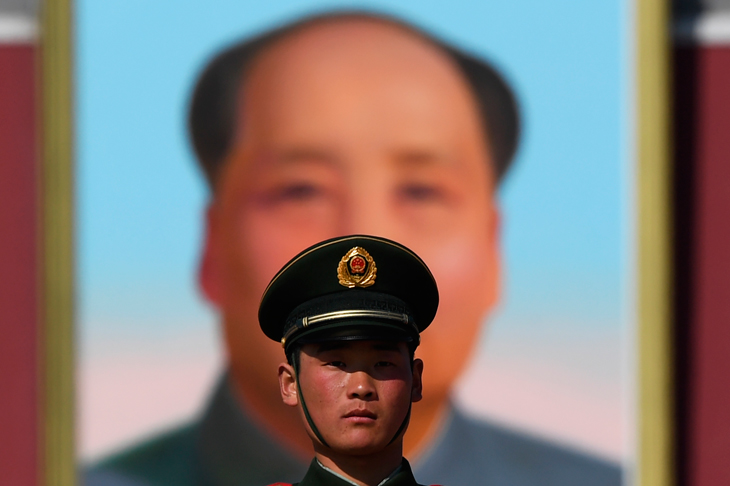Is there a Beijing Model of governance? Unfree politics steering decent economic growth, diluting the appeal of the West’s democracy and freedom. The ruler of China thinks so and wants to stay beyond his ‘term limit’ to see this Beijing Model’s triumph. A few running dogs in Australia seem keen to follow.
Xi Jinping is the first Chinese Communist leader to have been born (in 1953) since the founding of the PRC in 1949. He did not study abroad or spend early years outside China like most predecessors. Is he a nationalist, like a bunch of other new world leaders? Very much so. Xi knows grassroots China, county-level China, and province-level China. Beijing, as well as the non-Chinese world, was a late stop for Xi. He’s a local politician, newly endowed with global vision, now essential for a Beijing leader in light of China’s rise.
For those with eyes to see, Xi is asserting a brand of nationalism that should alarm the Australian democracy.
‘Trump pushes Australia toward China’ wrote Hugh White recently in the New York Times. It was pointless when he wrote it and worse a few days later when Trump asserted full-throated continuity with decades of US policy toward China, which from Nixon to Obama has never pushed Australia toward Beijing. White wants Australia to get closer to China; he just pins the causation on Trump.
Xi and his advisers, already challenging the West on Asia’s oceans and in Africa’s infrastructure, now claim an interrelation between global trends and China’s internal politics. A choice exists, Xi suggests, between Election Democracy (the West) and Evaluation Democracy (China and a growing list of others).
The ‘China Dream’ of Beijing’s Evaluation Democracy will become the world’s leading pattern of governance, for it trusts leaders and avoids chaos. One doesn’t find this in English-language statements of Beijing’s intent, so perhaps White missed it. Evaluation Democracy, a term coined by Chinese scholar Chen Fangren, is Eastern meritocracy. Virtuous leaders are chosen from a holy circle at the top. Later, office-holders will listen to public opinion as it ‘evaluates’ their performance from below. The Coombs building will love this, for experts will channel the evaluations. In the West’s Election Democracy, universal suffrage votes in leaders, but between elections leaders, according to Dr Chen, may or may not listen to grass roots views. When left-wing Americans lose an election, for example, their inclination is to pick up their marbles and turn to street politics, strikes, and litigation. Is this evaluation?
A decade ago Americans and Australians overwhelmingly favored ‘Election Democracy’ because of its fixed rules. Obama’s acerbic rebuke to Republican Eric Cantor in 2009, ‘Elections matter, Eric,’ when Democrats and Republicans argued about Obamacare, seemed like gospel. But today in most democracies, constant polls, media barrage, the centrality of personality, and enormous sums of money have reduced faith in elections. The fights between Rudd and Gillard, then Abbott and Turnbull – neither adjudicated by the electorate – didn’t help.
The Chinese scholar Chen finds the magic of Evaluation Democracy in four thousand years of Chinese history. ‘Continuous consent to govern’ has allowed emperors and politicians alike to ‘focus on proper results for the common good’. ‘Average people’ are too busy with their private lives to ‘take on the heavy burden’ of selecting leaders ‘fit for office’.
But continuous consent to rule in Evaluation Democracy is tricky to pull off. In today’s China, meddling by ‘retired’ leaders is a major barrier to ‘citizen evaluation’ of current leaders. Cronyism will have its pound of flesh. The Beijing Model, says Chen, ‘leaves the selection of a government to government leaders themselves [the holy circle], who have in-depth knowledge of each other’ and know ‘what it takes to be an effective leader’. This sounds like the objections raised inside Republican circles to outsider Trump before his election.
Election victory in the US and increasingly in Europe quite often goes to an ‘outside’ or ‘common sense’ candidate, whether good or bad, rather than to a wealthy one. Few in the Beijing establishment understand this. Yet in 2016 the Chinese man and woman in the street had a different instinct, sniffing condescension at home and abroad; according to the Economist’s pile of anecdotal evidence, millions of ‘old hundred names’ (lao bai xing, unnamed folk), favored Trump. I had the same impression in China during September. One Chinese adviser to Xi Jinping says ‘in China political openness comes from the inside’. Time will tell how far political openness that comes and goes from the top can proceed. Of course, it is the dream of EU wizards, the Davos connection and the ANU elite.
If the Beijing Model fails, Xi Jinping’s descent would be a minor part of the crisis. Arguably this is a bigger issue for world politics than arms races, Middle East suffering, the Dollar level, Trump’s plans, Isis, Russia’s strutting, Immigration surges, drones, the Trump-Taiwan phone call, or anything else. I think White might agree on this point.
On our side of the fence, we must admit that hope for the Democratic World model under George W. Bush has shriveled. Power Politics under American leadership is what Trump should pursue and Turnbull should support. Our foreign policy gurus chatter about a list of issues (North Korea has topped it for eleven frozen years). But our shopping list is utterly at variance with Beijing’s shrewder realpolitik. Details don’t matter to Xi compared with this balance of power; thus China’s bemused level-headedness over the Tsai-Trump phone chat which sent America’s not-so-very intelligentsia reaching for the bottle. Xi likes North Korea just as it is.
Nevertheless, Election Democracy lends a steady beat of certainty to the choice of leaders and policies. This messy sequence is surely better than the everlasting groping of so-called Evaluation Democracy. Our experts exit from Davos and the Coombs building optimistic that China is being integrated into the liberal international order. The Chinese elite in Beijing have different ideas.
It means no slight to China to say the US should remain the world leader for a while. I respect Chinese civilisation, having observed it first-hand for half a century. But if Washington vacates the top spot, either willingly or otherwise, a new world leader cannot simply take over, like a motorist occupying a newly available parking slot. Leadership is not fungible (cars are). US leadership means a worthy worldview as well as being Number One in measurable terms.
Got something to add? Join the discussion and comment below.
Get 10 issues for just $10
Subscribe to The Spectator Australia today for the next 10 magazine issues, plus full online access, for just $10.
You might disagree with half of it, but you’ll enjoy reading all of it. Try your first month for free, then just $2 a week for the remainder of your first year.














Comments
Don't miss out
Join the conversation with other Spectator Australia readers. Subscribe to leave a comment.
SUBSCRIBEAlready a subscriber? Log in